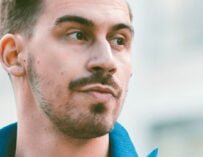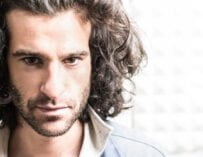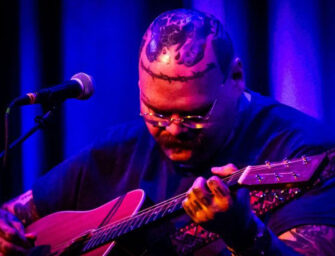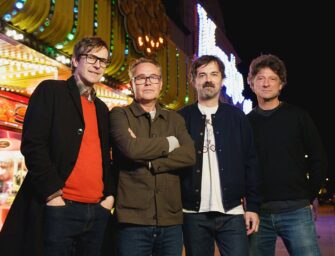


This behind the scenes songwriter helped launch Matt Willis from Busted’s solo career, co-wrote McFly’s hits and contributed to Gabrielle Aplin’s recent success
![]() ulian Emery might not be a familiar name to the casual music fan, but to those in the industry, and any of the 300,000 McFly fans (come on, admit it!) who bought their 2006 platinum-selling album Motion In The Ocean and read through the credits, the name of this songwriter-producer will have appeared and reappeared on many an occasion. Working as part of Collective – a songwriting team formed with Jason Perry (formerly of British rock band A) and Daniel P. Carter (later a Radio 1 DJ) – Emery contributed significantly to the solo career of Busted’s guitarist-singer Matt Willis, co-writing almost his entire album, including Top 10 single Up All Night, before going onto write and produce for McFly, all in the same year. Motion In The Ocean spawned three No 1 singles and, with their signature rock-infused pop sound, Collective and Julian Emery’s reputation became quickly established.
ulian Emery might not be a familiar name to the casual music fan, but to those in the industry, and any of the 300,000 McFly fans (come on, admit it!) who bought their 2006 platinum-selling album Motion In The Ocean and read through the credits, the name of this songwriter-producer will have appeared and reappeared on many an occasion. Working as part of Collective – a songwriting team formed with Jason Perry (formerly of British rock band A) and Daniel P. Carter (later a Radio 1 DJ) – Emery contributed significantly to the solo career of Busted’s guitarist-singer Matt Willis, co-writing almost his entire album, including Top 10 single Up All Night, before going onto write and produce for McFly, all in the same year. Motion In The Ocean spawned three No 1 singles and, with their signature rock-infused pop sound, Collective and Julian Emery’s reputation became quickly established.
More recently, after developing a more mature sound with regular writing partner Jim Irvin, Emery has carved a successful career in pop songwriting and production that means he’s a highly sought-after collaborator in both the UK and the USA. His cuts have found their way onto albums from established acts including Gabrielle Aplin, Lissie, Gavin Degraw and Simple Plan, but he’s also known for working with up-and-coming artists such as X Factor‘s 2011 finalist Amelia Lily.
Although regularly jetting over to LA and Nashville, we find Julian at his home in Buckinghamshire with his one-year-old son, taking a short break before going back into his studio in London. It sounds like an exciting lifestyle, and a lot of fun, but we soon discover that there’s a lot of hard work and many years of slogging away without reward that need to happen first…
What was your musical background?
“My dad was a classical musician in a number of orchestras around the country, including the BBC Symphony Orchestra, and a lot in Europe too. He played percussion on James Bond films, Carry On films and also the theme tune for Mr Benn! So I started hearing the classics in the household, along with more contemporary composers like Stockhausen and Boulez.
“The first time I got really excited by music was when I heard Eye Of The Tiger by Survivor. I was 10 years old and when I heard that clutch crash cymbal with a kick drum and a distorted guitar hitting that action, I was smitten forever. Then someone introduced me to Rush and played me Temples Of Syrinx. The singer had such a high voice, he sounded like a girl, but I remember thinking it was fantastic. My mum and dad bought me three Rush albums for Christmas that year, and that was me off on my way.”
What was the first instrument you picked up?
“It was probably drums because my dad had a kit. I went onto trumpet and got to a reasonable level, but ditched that when I found the guitar. A friend at school had a beautiful vintage Fender Jag and, stupidly, we went down to our local music shop and traded it in for a new Squier Strat! They tried to talk us out of it, but we wanted the shiny new model.”
[cc_blockquote_right] DON’T MAKE WRITING FEEL LIKE WORK, OTHERWISE YOU’RE GOING TO GIVE THE EXPERIENCE NEGATIVE CONNOTATIONS [/cc_blockquote_right]
Were you playing in bands then?
“I was in a local band who just did rock covers, then carried on playing in clubs and bars in blues cover bands around the age of 17. When you’re making money at that age, playing music, it’s a dream come true and having a taste of being paid to play guitar steered me on the session route, rather than doing my own music. The prospect of making money through music, and being able to play solos, was more enticing than making little ideas up and trying to get signed.”
How did you make the switch from being a session guitarist to becoming a songwriting?
“I’d always been writing and recording in the studio at home, then I started producing ‘show records’ that were copies of cast recordings for a company. I’d book session players from the Royal Philharmonic and people who were singing in the shows at the time – I recorded about 30 albums in four years. I kept writing and producing, but I was progressing as a guitar player as well, so started sessioning for pop bands. I joined Atomic Kitten and became their guitar player for two or three years, then I was a session guitarist for all sorts of people like Enrique Iglesias and Kym Marsh [from ITV’s Popstars-winning band Hear’Say]. Kym’s A&R was Paul Adam, and I bent his ear off until he agreed to let me write and produce a B-side, which I did. Then about a year after that Busted split up and Matt Willis was looking to do solo stuff, and Paul Adam was his A&R as well so, because I had a relationship with Paul, I put myself forward. That was my path into ‘writer land’ and I signed a deal with Warner Chappell.”
So was it case of being in the right place at the right time?
“I wouldn’t say that. It was having a reputation for producing good demos and writing some good songs. I’d slogged away for so long, and badgered so many people, that something had to give. I was also fortunate to know Jason Perry – someone who’d had some success in a rock band and had better relationships with A&Rs than me – and without him I don’t think I would’ve got the gig. Also, once I knew it was up for grabs, I recorded several ideas and produced them to sound as much like a finished record as possible. So it was as much about being an able producer as it was being a good writer.”

So Matt Willis was your first proper songwriting job. What was your first day at ‘work’ like? How did you approach the project?
“The whole ethos of Collective, our songwriting team, was to have a good time and write some songs while we were doing it. We’d usually start off with an American-style breakfast somewhere, buy some sweets, then we’d knock around the studio, talking and larking around. Then we’d do maybe a couple of hours putting vocals and ideas down. After that we’d go to the cinema or Nandos! The whole ethos to make it enjoyable, and it worked. Matt was a young guy so he wanted to have a good time with us.
“Having said all that, I realised this was a once in a lifetime opportunity for me, and I’d spent so many years trying to get my music out there, so I just worked and thought about these songs 24/7. I was working hard, but when we were together we were having a good time laying down the vocal. Don’t make writing feel like work, otherwise you’re going to give the experience negative connotations.”
Do you still have that same approach now, or have you matured, and does it depend on the artist?
“In songwriter-land you’ve got to be slightly more studious, and as you get older and have commitments of family, so you can’t be laissez faire about everything. But I still try to make it not feel like work, so we’ll spend the first hour or so chatting or going for a coffee, and we’ll ease into it slowly. Of course with some sessions, like when I’m in LA where they’re a bit more regimented, or Nashville where you might only have three hours to write, you’ve just got to shake hands and start writing a song. But if I had my own way I’d make it more relaxed.
Do you ever get a chance to write on your own, or do you prefer collaborating anyway?
“My preference is to have the voice that’s going to end up on the recording in the room as you’re writing, because I like to write around the tone and style of the voice, and let the production complement the vocal. If you don’t have the vocal there, you’re shooting in the dark.
“When I get inspiration on my own, I record it on a voice recorder or work it up on ProTools a bit, and stockpile them for writing sessions. But the more I do it I prefer to write on the spot and see what comes up. But obviously that’s slightly more risky!”
[cc_blockquote_right] YOU NEVER KNOW WHAT’S GOING TO GET RELEASED AND WHAT ISN’T. YOU’RE IN THE LAP OF THE GODS! [/cc_blockquote_right]
What do you find normally arrives first when you’ve got the artist sat there and a blank page in front of you?
“Personally, I tend to start with a musical atmosphere and I find that’ll inspire a certain type of topline and a lyric, generally in that order. I do most of my writing with Jim Irvin and he deals with the lyrics more, and I’m sat at my ProTools system with three guitars – an acoustic, bass and electric – and a keyboard. He’ll be chatting with the artist as I starting to play at a quiet level, coming up with ideas. They won’t be thinking about concepts so much, more general chit-chat and what’s important to them. Once we’ve got to know the artist a bit, we’ll find something to write about that fits the musical idea I’ve had, usually.”
Who are you working with at the moment and what projects have you got coming up?
“I’ve just had a song with Gavin Degraw, who I’m a big fan of, so that was quite something to get a song with him. I recently wrote with Gabrielle Aplin, a song called Start To Time, and Lissie who’s just about to release her second album. Then I have a band called Nothing But Thieves, who Jim and I have written about six or seven songs for.
“I always forget who I’m about to work with, but I’ll usually find out what I’m doing on a weekly basis! You never know what’s going to come in – it’s quite exciting. I’ve got a fantastic manager called Mark Wood who I’ve been with for five years and generates a lot of work for me.”
How long do you tend to work with each artist?
“We usually find two days is a good time to get the nub of the idea down and finish it off without having to rush anything. First day is working through two or three ideas and working until we find something that sticks. If you’ve just got one day it can be beneficial because you’re under pressure to get something down and that’s a fun challenge, but sometimes if nothing’s coming, you have to make do with something that everyone knows isn’t that great. So two days is really good to hone the lyric as well.”
Do you have any big aspirations as a songwriter, or do you just take each day (or week) as it comes?
“Well of course when you have a family, my only priority now is securing their future for the rest of our lives. If I can do that through music that’s fantastic, but it’s a day-to-day thing – it’s very difficult to have much control over what’s happening. You never know what’s going to get released and what isn’t. You’re in the lap of the Gods!”
Interview: Aaron Slater
Look out for Julian Emery’s name cropping up in the credits of many a pop masterpiece to come. In the meantime, you can enjoy a few examples of his songs for Gavin Degraw, Lissie and Simple Plan below…
































Related Articles